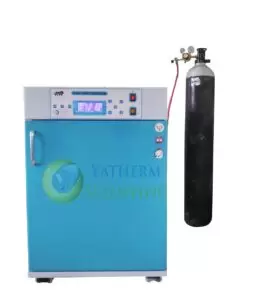WHAT IS A CO2 INCUBATOR?
A CO2 incubator, or carbon dioxide incubator, is a specialized piece of laboratory equipment designed to provide a controlled environment for the cultivation and growth of cells, tissues, and microorganisms. These incubators are primarily used in cell culture, microbiology, and other life science research applications.
Key features of a CO2 incubator typically include:1. Temperature Control:
CO2 incubators are equipped with precise temperature control systems to maintain
a constant and controlled temperature, often set at 37°C to mimic the human
body's temperature.
2. Carbon Dioxide (CO2)
Control: These incubators can regulate the concentration of carbon dioxide
in the atmosphere, usually at around 5% to 10%. This is essential for cell
culture, as many types of cells require a higher CO2 concentration than is
present in ambient air.
3. Humidity Control:
Maintaining proper humidity levels is important for preventing cell and tissue
desiccation. CO2 incubators often include a humidity control system to keep the
relative humidity at an optimal level.
4. Sterility: CO2
incubators are designed to be sterile environments to prevent contamination of
cell cultures or microbiological samples. They typically have HEPA filters and
are easy to clean and disinfect.
5. Monitoring and Alarms:
These incubators come with monitoring and alarm systems to alert users if there
are fluctuations in temperature, CO2 levels, or any other critical parameters.
This helps maintain the integrity of experiments and samples.
CO2 incubators are used in
various fields of research, including cell biology, regenerative medicine,
microbiology, and pharmaceutical development. They provide a controlled
environment to support the growth and maintenance of cells and microorganisms
for experiments, drug testing, and other scientific investigations.
HOW ARE CO2 INCUBATORS USED?
CO2 incubators, also known as
carbon dioxide incubators, are specialized laboratory equipment used to create
and maintain controlled environments for cell culture and tissue culture
experiments. These incubators are designed to regulate temperature, humidity,
and the concentration of carbon dioxide (CO2) to mimic the conditions necessary
for the growth and maintenance of cells and tissues. Here are some of the
primary purposes for which CO2 incubators are used:
HOW IS CO2 used in incubators?
Typically, CO2 incubators are equipped with precise control systems that monitor and regulate the CO2 concentration, humidity, and temperature. Researchers and scientists can set these parameters to create an optimal environment for cell growth, tissue culture, or microbiological experiments. The ability to tightly control these conditions is essential for maintaining healthy cell cultures and conducting reproducible experiments in various fields of life sciences.
Read more about Horizontal Autoclave and
Muffle Furnace by Yatherm scientific manufacturer of scientific
equipment.




Comments
Post a Comment